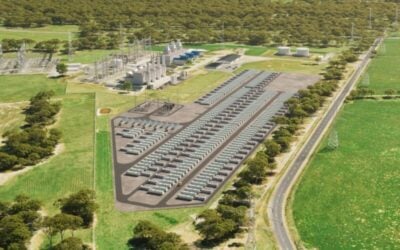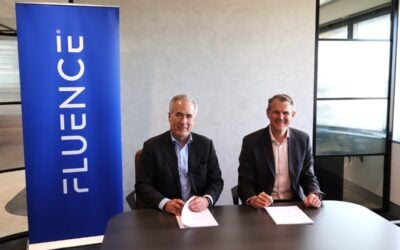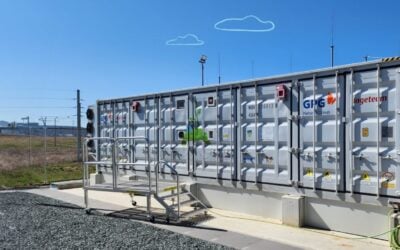Stem sees great potential in the “virtual power plant” business of aggregated, customer-sited storage. Image: Stem.
Energy storage start-up Stem says it sees “strong opportunity” for expansion of its business in Australia, Japan and the EU, in the week when the company closed a US$12 million funding round led by Japanese trading company Mitsui & Co.
The company also confirmed to PV Tech that it wants to use the investment to greatly expand its activities in grid-balancing through the aggregation of customer-sited storage devices. At the individual system level, Stem’s software and energy management systems use so-called ‘big data’ and predictive analytics to model a customer’s energy profile and make recommendations to maximise savings on their energy bills and reduce demand. When connected together as a network, the systems can also offer grid stabilising and other services.
Enjoy 12 months of exclusive analysis
- Regular insight and analysis of the industry’s biggest developments
- In-depth interviews with the industry’s leading figures
- Annual digital subscription to the PV Tech Power journal
- Discounts on Solar Media’s portfolio of events, in-person and virtual
According to a Stem spokeswoman, aggregation, where a “virtual power plant” is created through combining the storage and energy management capabilities of a number of batteries connected to each other, could make for better grid services and more compelling economics for customers. In November last year, Stem was awarded an 85MW contract to provide capacity through aggregated, customer-sited systems for Southern California Edison, one of the state’s main investor-owned utilities.
“By aggregating customer-sited storage systems, Stem’s network can serve as capacity to replace peaker plants, control voltage, enable a better demand response solution and provide customers a way to earn revenue from participating in grid services,” the spokeswoman said.
The participation of Mitsui & Co, one of Japan’s largest trading companies, in Stem’s Series C funding round, was announced by both parties at the beginning of the week. Mitsui stated that it was interested in numerous business cases for energy storage, including aiding the increased adoption of renewable energy, boosting grid stability and in markets where time-of-use charges exist, hedging against those.
The tie-up will help Mitsui to reach further into the US market, while allowing Stem better exposure in Japan, Mitsui said. The investment was also conducted as part of a programme by Mitsui to identify innovative technologies with business potential.
Panasonic recently showcased a system aimed at the Japanese deregulated electricity market, which will allow residential PV system owners to buy and sell electricity at the best prices, with a colourful customer interface. Image: Andy Colthorpe.
Stem will call on Mitsui’s customer base and sales and marketing channels, while allowing Mitsui to “gain hands-on experience in the intelligent energy storage space”.
According to the Stem, spokeswoman, the company has focused to date on regions where grid stability is a pressing concern and where regulatory conditions have allowed storage to begin providing that stability. These include the often talked about US regions of California, New York and Hawaii, where a combination of state level mandates, regulations and tax incentives at the federal level have led to the three regional markets being considered among the global leaders in energy storage.
“However, international markets like Japan, Australia and the EU share several of these same grid constraint challenges, and we see a strong opportunity for expanding our business model in these markets,” the spokeswoman said, highlighting the partnership with Mitsui and with Total Energy Ventures as key to this approach.
Mitsui has taken an increasing interest in participating in the energy industry as an Independent Power Producer (IPP) and is keen to develop its “new power business” further. The energy market in Mitsui’s home territory is to be deregulated over the next couple of years, which, if successful would mean that businesses – and individuals – could become independent power producers (IPP). For example, at February’s PV Expo in Tokyo, Panasonic was already showcasing a new residential energy management system for rooftop solar combined with storage that allows the homeowner to buy electricity at the cheapest available prices and sell at the most attractive. Other Japanese companies including telecoms provider turned solar developer Softbank have already registered their interest in the retail electricity business.
Meanwhile, Reposit Power in Australia is already offering a residential storage system that allows the operator to sell on their electricity, usually PV-generated, while buying in grid power when necessary at the cheapest available price. Commenting on the Reposit scheme, IHS analyst Sam Wilkinson said the Reposit scheme was “one of the most interesting examples that I have seen” of software defining the purpose and use of energy storage systems. Wilkinson also said he saw the quality and innovative design of the software that drives energy storage and allows it to interact with the rest of the energy network as one of the major product differentiators in the nascent space.
Incidentally, Stem also has a tie-up with Japanese PV manufacturer and developer Kyocera, to provide solar-plus-storage in three US states, but the spokeswoman said there is no connection between this and the interest from Mitsui.






